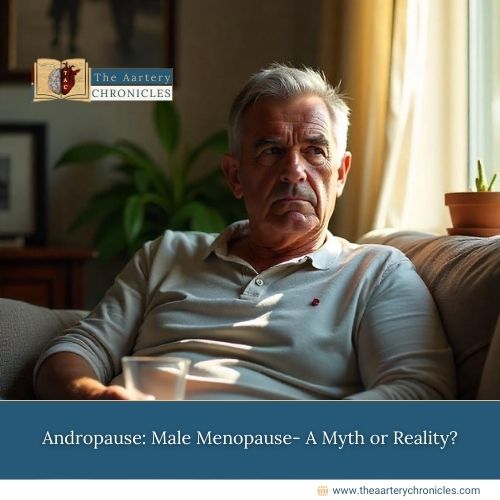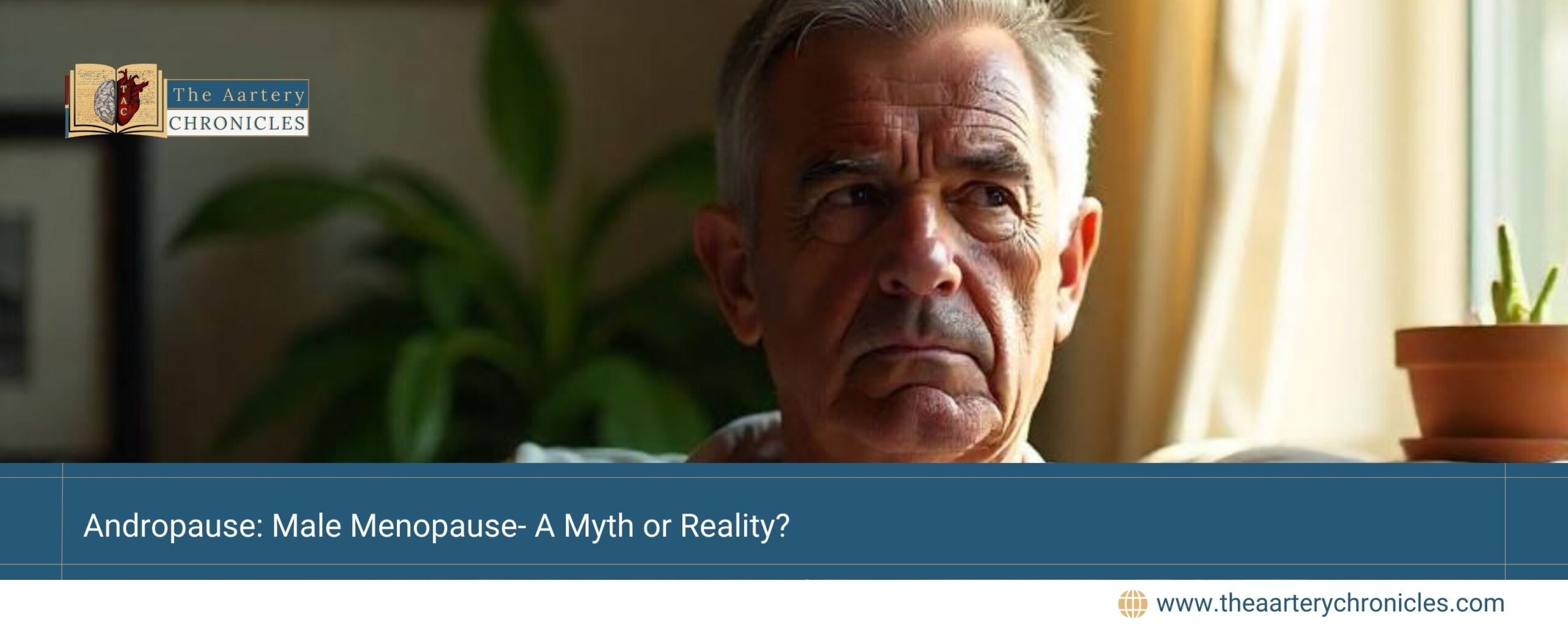

Andropause: Male Menopause- A Myth or Reality?
Introduction
While menopause in women is well-known and widely discussed, fewer people are familiar with a similar phenomenon that affects men—andropause. Andropause, commonly known as “male menopause,” refers to the age-related decrease in testosterone levels experienced by some men assigned at birth (MAAB). This typically occurs around the same time as menopause in women, usually in their late 40s or early 50s. This hormonal change can result in a range of physical, emotional, and psychological symptoms such as erectile dysfunction, reduced energy, loss of muscle mass, and mood changes. The primary treatment for this condition is testosterone replacement therapy (TRT), with close monitoring.
Understanding andropause is essential for men navigating these life changes and for their loved ones to provide support.
Male Menopause: A myth or reality?
The term “male menopause,” often referred to as andropause, is a misleading phrase commonly used in the media. This terminology implies that symptoms stem from a sudden decline in testosterone levels during middle age, similar to the experience of women during menopause, which is not accurate.
While testosterone levels do decrease as men age, this decline occurs gradually at a rate of about 1% per year starting around ages 30 to 40 and is generally not significant enough to cause issues on its own.
Testosterone, the male sex hormone responsible for body hair growth, strong bones and muscles, and sperm production, can gradually decline in men as they age, due to factors like
- Medication
- Illness
- Injury
- Lifestyle
This decline in testosterone is mistakenly labeled as “male menopause.” In reality, it should be viewed as part of male aging, more accurately described as testosterone deficiency syndrome, androgen deficiency in aging males, or late-onset hypogonadism.
Symptoms of Male Menopause
Unlike female menopause, where women lose the ability to ovulate, andropause does not affect sperm production. However, it progresses more gradually, with symptoms that are often subtle. This results in:
- Decreased Libido: Loss of sexual drive or reduced libido is one of the most common signs.
- Fatigue and Low Energy: Persistent tiredness or a lack of motivation to engage in physical activities.
- Mood Changes: Some men may experience irritability, mood swings, anxiety, or even depression.
- Hot Flashes: While less common, some men may experience sweating or hot flashes similar to women during menopause.
- Sleep disturbances: Difficulty falling or staying asleep can become more prevalent in men experiencing andropause.
- Cognitive Decline: Some men may notice difficulty concentrating or memory issues.
Some other common symptoms of male menopause include:
- Erectile Dysfunction
- Gynaecomastia (development of breasts)
- Infertility
- Loss of body hair
- Reduced testicle size
- Reduced bone density or osteoporosis (weak and brittle bones)

Causes of Male Menopause
1. Hormonal Changes
- Age-Related Decline: Testosterone levels gradually decrease with age, typically starting around the age of 30, leading to symptoms associated with male menopause.
- Late-onset hypogonadism: A condition where the testes produce little or no testosterone, which can develop later in life, particularly in men with obesity or type 2 diabetes.
2. Lifestyle Factors
- Poor diet: Nutritional deficiencies can negatively impact hormone production.
- Lack of Physical Activity: Sedentary lifestyles can contribute to weight gain and lower testosterone levels.
- Smoking: Tobacco use can impair blood flow and hormone production, leading to symptoms like erectile dysfunction.
3. Psychological Factors
- Depression and Anxiety: Mental health issues such as anxiety and depression can contribute to low libido, erectile dysfunction, low energy levels, and mood changes.
- Stress: Chronic stress can elevate cortisol levels, which may result in decreased testosterone production.
- Midlife Crisis: A “midlife crisis” may also play a critical role when men feel they have reached the midpoint of their lives. Concerns about their achievements in both their careers and personal lives can lead to depressive episodes.
3. Medical Conditions
- Chronic Illnesses: Conditions like diabetes, heart disease, and metabolic syndrome can affect testosterone levels and overall health.
Treatment for Male Menopause
The primary treatment for managing symptoms of andropause is testosterone replacement therapy (TRT), which is typically recommended by a primary care doctor, urologist, or endocrinologist. TRT has been shown to enhance libido, memory, muscle mass, and bone strength.
TRT can be delivered in several forms through:
- Gels, creams, or patches.
- Long-acting or short-acting doses of injection.
- Oral Medications
- Nasal inhaler
Throughout TRT, regular monitoring is crucial, with follow-up appointments every six to 12 months to track progress and adjust treatment as needed.
For some men, testosterone therapy alleviates bothersome symptoms of testosterone deficiency. However, for others, the benefits are uncertain, and there are potential risks. Although more research is required, testosterone therapy may promote the growth of metastatic prostate and breast cancer. It may also elevate the risk of heart attack and stroke, as well as contribute to blood clot formation in veins.
Doctors are likely to advise against testosterone therapy if fertility is a priority in the near future or if a patient has conditions such as breast or prostate cancer, untreated severe obstructive sleep apnea, uncontrolled heart failure, thrombophilia, or if they have recently experienced a heart attack or stroke.









